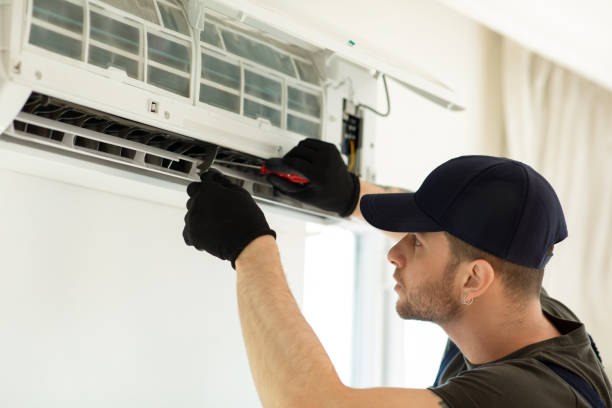As temperatures rise, air conditioning becomes a necessity for maintaining indoor comfort. However, the convenience of cool air often comes at a cost, with air conditioning contributing significantly to household energy consumption. Fortunately, there are numerous strategies and tips available to help minimize energy usage while still keeping your home comfortably cool. In this article, we’ll explore a range of practical tips for maximizing energy efficiency and reducing energy consumption when using air conditioning systems.
Optimize Temperature Settings
Set your thermostat to the highest comfortable temperature during the summer months. Every degree you raise the thermostat can result in significant energy savings. Consider using a programmable or smart thermostat to automate temperature adjustments based on your schedule and preferences, ensuring efficient cooling when needed and conservation when not.
Utilize Fans
Use ceiling fans or portable fans in conjunction with your air conditioning system to circulate cool air more effectively throughout the room. Fans create a wind-chill effect, allowing you to raise the thermostat setting without sacrificing comfort. Remember to turn off fans when you leave the room to avoid unnecessary energy consumption.
Seal and Insulate
Seal gaps and cracks around windows, doors, and ductwork to prevent cooled air from escaping and warm air from infiltrating your home. Additionally, ensure that your home is adequately insulated, especially in the attic and walls. Proper insulation helps maintain consistent indoor temperatures and reduces the workload on your air conditioning system.
Maintain Your Air Conditioner
Regular maintenance is essential for optimizing the performance and energy efficiency of your air conditioning system. Schedule annual professional maintenance to clean and inspect the unit, replace filters, and address any issues promptly. Clean or replace air filters every one to three months, as dirty filters restrict airflow and force the system to work harder.
Use Energy-Efficient Equipment
When purchasing or replacing air conditioning equipment, opt for models with high energy efficiency ratings, such as ENERGY STAR certified units. These units meet strict energy efficiency criteria set by the U.S. Environmental Protection Agency (EPA) and can help reduce energy consumption and utility costs over time.
Practice Smart Cooling Habits
Adopt smart cooling habits to minimize energy usage and maximize comfort. Keep curtains or blinds closed during the hottest part of the day to block out sunlight and reduce heat gain. Cook outdoors or use appliances that generate less heat during peak hours. Additionally, avoid using the oven or dryer on hot days, as they can contribute to indoor heat buildup.
Utilize Programmable Thermostats
Take advantage of programmable thermostats to create cooling schedules that align with your lifestyle and occupancy patterns. Program the thermostat to raise the temperature when you’re away from home or asleep and lower it before you return or wake up. This helps reduce unnecessary cooling and ensures efficient operation of your air conditioning system.
Implement Zone Cooling
If possible, implement zone cooling by installing multiple thermostats or ductless mini-split systems to control temperatures in different areas of your home independently. Zone cooling allows you to customize comfort levels based on occupancy and usage patterns, reducing energy consumption and minimizing wasted cooling in unoccupied areas.
Enhance Airflow
Ensure proper airflow throughout your home by keeping vents and registers unobstructed by furniture, curtains, or rugs. Clean vents regularly to remove dust and debris that can impede airflow and reduce efficiency. Consider investing in duct cleaning services to remove accumulated dirt and improve air quality.
Take Advantage of Night Cooling
During cooler nighttime hours, take advantage of natural ventilation by opening windows and allowing fresh air to circulate throughout your home. This can help lower indoor temperatures and reduce reliance on air conditioning during the day. Be sure to close windows and blinds early in the morning to trap cool air inside before temperatures rise.
With rising energy costs and environmental concerns, maximizing energy efficiency in air conditioning is more important than ever. By implementing the tips outlined in this article, you can significantly reduce energy consumption while maintaining indoor comfort during the hot summer months. From optimizing temperature settings and utilizing fans to practicing smart cooling habits and investing in energy-efficient equipment, there are numerous strategies available to help you achieve energy-efficient air conditioning and lower utility bills. By incorporating these tips into your cooling routine, you can enjoy a cool and comfortable home while minimizing your carbon footprint.
Don’t postpone the repair of your air conditioner. Remember, fixing the issue is both easier and more cost-effective immediately after a breakdown. If your air conditioner is operational but producing odd noises or not effectively cooling the room, it’s time to reach out to technicians.
Avoid waiting until the air conditioner completely breaks down. Delayed repairs increase the likelihood of requiring extensive and complicated fixes. Enduring a few days without air conditioning during the summer heat in San Diego County, CA can cause significant discomfort for the entire family. By contacting the experts at SDAC Heating & Air Conditioning, you can prevent this problem.
Contact us:
